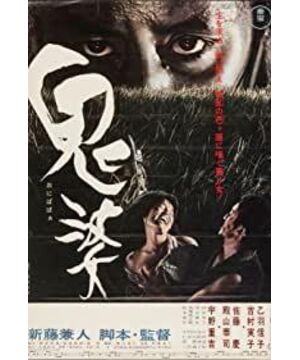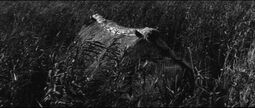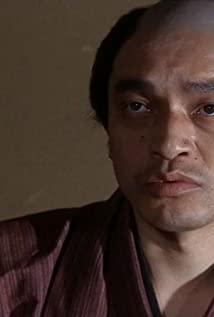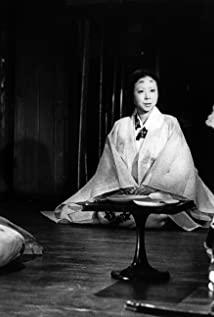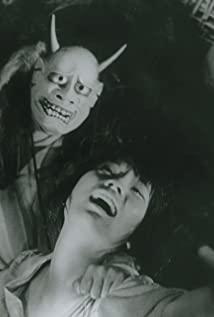On the third night of moving to Paris, I wanted to go to a random movie. The manual of the archive says "Onibaba" at 9 o'clock. After reading the introduction, I thought it was a horror film, and then I read the film review, saying that it was a description of dark human nature, and I became interested. After watching it, I feel that the name "Haunted" may make the film lose many viewers who don't like watching horror movies. Maybe it would be better to call it "Mask"?
I have always been curious about the abyss of human nature. Just like the black hole in the film, one step into it will turn it into a bone, and countless crows will be shocked. How much bone does it take to fill it up? (After filling in, the world starts all over again, producing another sinful species.)
The beginning is the endless weeds. The screen is filled with this piece of grass that is as tall as a person, and the grass stems smashed by the wind are frustrating. Three minutes later, the killing started here. The daughter-in-law and mother-in-law stabbed the deserters to death, stripped their clothes, and took them to meet their patron, a man who collected war items, and exchanged two belts of millet. Go home, drink water, eat, sleep. Shots and edits are crisp and clean, and it all works as it should. Like animals, they have no language or much to say, only instinct. (And the depressing and thrilling drums and howls keep reminding the audience that human activities, excluding civilization, are more terrifying than the most ferocious beasts.)
Hachi is back. (Remember that the French translation of "eight" on the subtitle is Hachi) With the beads and the spear, cross the river back to the grass. (The impression of Buddha and the murderer overlapped on him.) He and they were former neighbors, and when we ate together, we talked about his mother-in-law having a son who never returned, and about war. My mother-in-law said that this world is hell. My daughter-in-law said, I am very sad. Hachi said, I need a woman!
Hachi, who came back from the battlefield, vented the violence in his body against the air every day, in order to dispel the desire in his body. He seduced his daughter-in-law without any suspense, and as soon as the two met, they began to copulate like animals. Every night, my daughter-in-law's body is like a weed swaying after the rain, the desire and pleasure of the flesh dominate all reason. (Howling through the grass like a beast, she has long lost her senses.)
Love is a funny and unfamiliar word in this film. And human beings should be like this, why do they continue to use love to whitewash sexual desire?
From the behavior of the mother-in-law, it can be seen that her obstruction to her daughter-in-law and Hachi is not based on three principles and five constants, but an ugly but logical possessiveness: she wants to serve me, she can't go. And for my long-dry body. She spied on her daughter-in-law having sex with Hachi, and her instincts gushed out of her. She grabbed the trunk, grabbed her shriveled breasts, and moaned to the sky. She seduces Hachi to fill her up, and becomes irritated after being rejected.
At this point, one of the most important characters in the film appears. He is a defeated general, wearing a mask that looks hideous but is actually sad. He asked his mother-in-law to guide him out of the grass, and told his mother-in-law that he was wearing a mask because his face was too beautiful, and he was afraid of being destroyed by the war. The truth is, the general's face was burned, and he wore a mask to cover up the scars. From this, one of the most important intentions in the film also appears: the mask. The general is the only "person" in this film. He hates war and doesn't kill easily, because he knows good and evil; he wears a mask and refuses to show the hideous scars to others, because he knows beauty and ugliness. In addition, he has the most important attribute of being a "human": camouflage. As small as expressions, as large as language, and even the entire human civilization, they are all instinctive masks for the species "human". War is the mask of killing, commerce is the mask of greed, science and religion are the mask of conquest, art... (Then what is art for?... Or, religion is not a redemption, but art is.)
After the mother-in-law killed the general, she "re" put on the mask. She pretended to be the devil of hell and lurked on the way for her daughter-in-law to find Hachi, in order to give her the fear that "greedy lust will go to hell". And this is the most ironic scene in the film: the third time, the daughter-in-law still can't help the temptation of desire, she runs like Hachi's residence, and the two are entangled in front of the devil. Reverence for the gods and fear for demons are vulnerable to real physical pleasure.
The mother-in-law wore a mask and looked at them rolling on the ground in disbelief. She knew that she was not a human being, and that there was no one in this world, and they were all naked desires!
Many people think that the mother-in-law couldn't take off the mask because she scare the retribution of her daughter-in-law. In my opinion, it is more like a metaphor of "the devil is in the world". Once a person is infected with original sin, there is nowhere to escape. And once such people reconnect with human civilization, they will suffer unbearably. Evil thoughts have sprouted deeply in the body, and in the end, only people are not like people, and ghosts are not like ghosts. The daughter-in-law smashed the disguise and civilization of being born with an axe, and she and Hachi indulged their lust even more unscrupulously, dancing with evil beside the devil.
View more about Onibaba reviews


